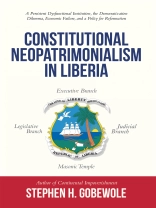Liberia is a dysfunctional country as the result of its patronage practices, which include nepotism, bribery, and election fraud.
Stephen H. Gobewole, who grew up in Liberia, explains how these corrupt practices have created a dysfunctional institution. He traces the history of the country and answers question such as:
• How have corrupt political practices contributed to the country’s poor economy?
• Why has public corruption been allowed to persist for so long?
• What similarities does Liberia share with other sub-Saharan African countries?
• How have elections been manipulated throughout the years?
Other topics include United States involvement in Liberia, why so many Liberian presidents continue to act unethically, and the country’s civil war.
The book provides empirical evidence, including statistical figures and charts, to demonstrate that the corrupt system in Liberia has led to abject poverty, lower living standards, national instability, and underdevelopment.
Moreover, the author shares public policy proposals that would ease problems, including the effective enforcement of anticorruption regulations.
O autorze
Stephen H. Gobewole grew up in Liberia and received a bachelor’s and master’s degree in management from Rhode Island College. He also attended Bryant University, where he earned a financial planning certificate. He received a Ph.D. in public policy with a concentration in public management and leadership from Walden University. He worked in banking for many years, serving as assistant vice president and branch manager at various banks. He is also the author of Liberia’s Political Economy: An Examination of Public Institutional Quality, Continental Impoverishment: The Effect of Extractive Institutions, and a chapter in Insights into Economics and Management Vol. 12.












